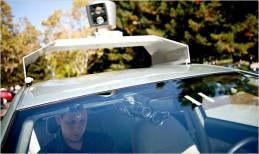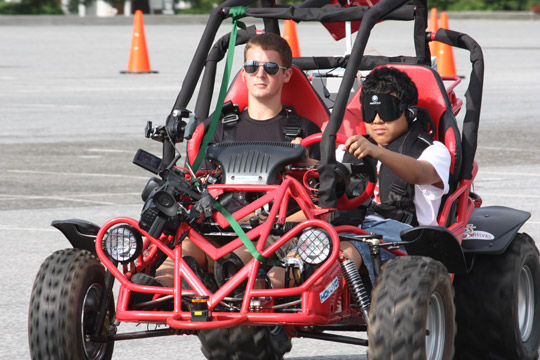Ask Ray | The Blind Driver Challenge
December 19, 2010
Hi Ray,
I will be attending a gathering of National Federation of the Blind leaders in Daytona, Florida, on the evening before the Blind Driver Challenge event early on Saturday, Jan. 29 before the start of the Rolex 24 Race. [more information]
This high-profile event will be the first public demonstration of a blind person driving a vehicle without any form of guidance provided by another person. Obviously this will be an historic happening.
Driving for blind people is almost certainly something we will experience in our lifetime even without factoring in the plan to live forever. Based on what we know, the problem is not so much the technology as it is the laws and social/political acceptance, but those barriers will also crumble!
Best,
James Gashel
Secretary, National Federation of the Blind

Google’s self-driving car prototype on a road test. (Image: Google)
James,
Sounds exciting. The technology is coming into place. It will happen within about ten years. Google cars are driving experimentally in California (although they still manned by trained operators). And it is not as if sighted people are doing such a great job of driving cars, with hundreds of thousands of deaths each year worldwide. When we get to the era of blind people driving, it will be much safer.
Best,
Ray
The Blind Driver Challenge
 The National Federation of the Blind (NFB) and Virginia Polytechnic Institute and State University, College of Engineering (Virginia Tech) partnered in July to demonstrate the first street vehicle equipped with technology allowing a blind person to drive independently.
The National Federation of the Blind (NFB) and Virginia Polytechnic Institute and State University, College of Engineering (Virginia Tech) partnered in July to demonstrate the first street vehicle equipped with technology allowing a blind person to drive independently.
The groundbreaking Blind Drive Challenge initiative of the NFB Jernigan Institute challenges universities, technology developers, and other interested innovators to establish NFB Blind Driver Challenge (BDC) teams — in collaboration with the NFB — to build interface technologies that will empower blind people to drive a car independently.
“The challenge was not the development of an autonomous vehicle that could drive a blind person around, but rather the creation of nonvisual interfaces that would allow a blind person to actually make driving decisions,” said Dr. Dennis Hong, Director of the Robotics and Mechanisms Laboratory at Virginia Tech.
Also see:
A history and survey of automated and driverless cars

